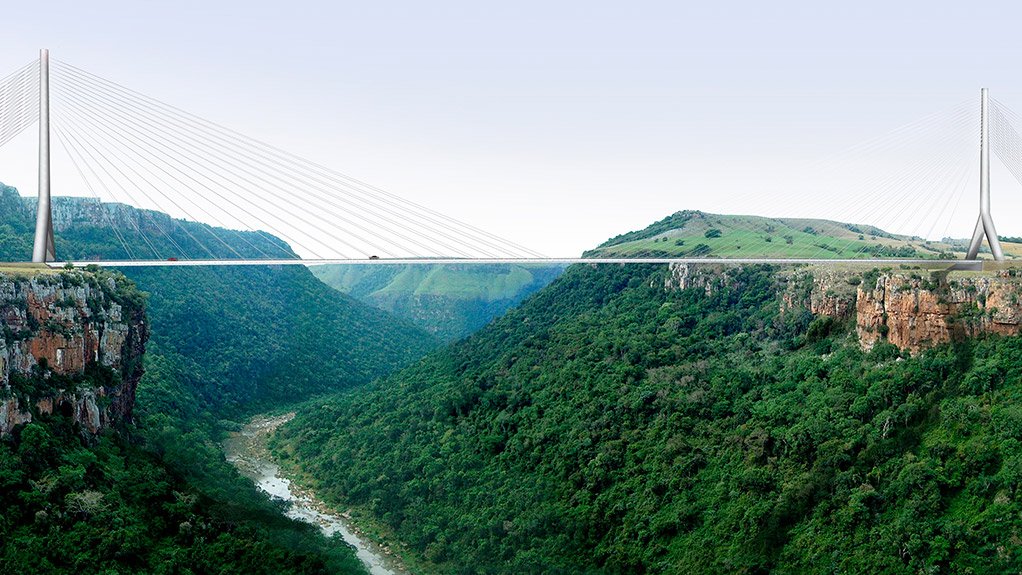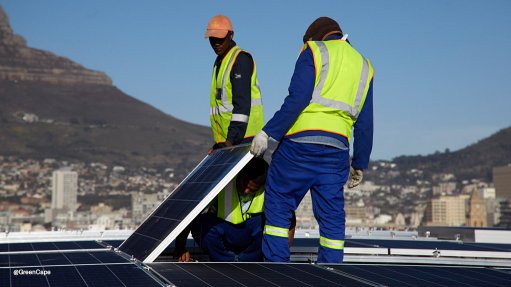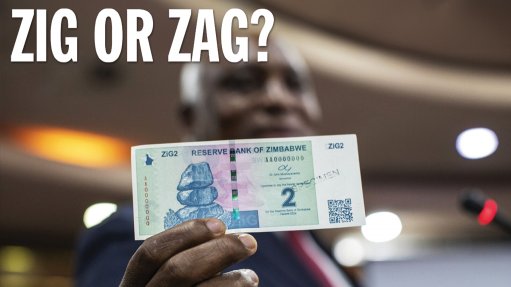N2 Wild Coast Toll Road megabridge projects, South Africa
Name of the Project
N2 Wild Coast Toll Road (N2WCTR) megabridge projects.
Location
The bridges will be built over the Msikaba and Mtentu river gorges, both near Lusikisiki, in South Africa’s Eastern Cape province.
Project Owner/s
South African National Roads Agency Limited (Sanral).
Project Description
The Msikaba and Mtentu bridges form part of the N2WCTR project.
The N2WCTR is a major project for the Eastern Cape and forms part of government’s third Strategic Infrastructure Project, the South-Eastern node and corridor development, whose key purpose is to serve as a catalyst to uplift economic growth in the Eastern Cape and KwaZulu-Natal. The project entails a 410 km stretch of road from East London to the Mtamvuna river on the border of the Eastern Cape and the KwaZulu-Natal.
Once completed, the new shorter, flatter and faster N2WCTR will cut travelling time between Mthatha and Durban by between 1.5 hours (light vehicles) and 3 hours (heavy freight), resulting in a time-cost saving of about R1.5-billion a year for road users. In addition to improving logistics and trade between the Eastern Cape and KwaZulu-Natal, the new route will also stimulate local economic development for the Pondoland area, particularly in tourism.
The 1.13-km-long Mtentu bridge, which includes a 260-m-long main span, will be one of the longest main-span-balanced cantilever bridges in the world. Only ten prestressed concrete girder bridges worldwide have a main span of 260 m or longer. Reaching heights of more than 220 m above the river valley, it will displace the Bloukraans bridge, in the Western Cape, as the highest bridge in Africa and the southern hemisphere. The 141-m-tall Pier No 9 will also be the tallest bridge pier in Africa and the southern hemisphere.
Being both one of the longest main-span-balanced cantilever bridges and highest bridges in the world makes the construction of the Mtentu bridge a technically highly challenging project. The remote location and local social dynamics add to this complexity.
The 580-m-long Msikaba bridge will be the longest main span – constructed using the cable-stayed method – bridge in Africa, and the second-longest main bridge span in Africa after the Maputo-Catembe suspension bridge, in Mozambique. With a deck height of 194 m above the river valley, Msikaba will become the third-highest bridge in Africa and the 133rd highest in the world. The Msikaba bridge cable-stay design will ensure that the construction of the bridge will have no direct impact on the pristine gorge environment almost 200 m below, which is one of the environmental requirements in building the bridge.
Sanral is forging ahead with the restart of work on the Mtentu bridge site. The R2.5-billion megabridge project, which forms part of the flagship N2WCTR, was derailed in late 2018 following protest action by community groups from surrounding villages. Work was stopped on site for almost three months, with locals demanding jobs and subcontract work packages, as well as the replacement of the Project Liaison Committee and certain staff and officials linked to the contract. By early January 2019, a resolution and a way forward on all issues raised by the protesters had been reached. However, the main contractor, Aveng Strabag Joint Venture, refused to resume work, forcing Sanral to terminate the contract.
Potential Job Creation
Semiskilled and unskilled labour will be sourced locally. Local small, medium-sized and microenterprise (SMME) contractors and suppliers of goods and services will be used to meet the required contractor participation goals on the two projects, creating much-needed jobs and local economic development. The two megabridge projects, together with the seven adjacent roads packages, are expected to create about 8 000 full-time equivalent jobs during construction, while more than R2.8-billion will flow to SMMEs, the bulk of which will be from the OR Tambo and Alfred Nzo district areas, in the Eastern Cape.
Capital Expenditure
The Msikaba bridge project will cost an estimated R1.65-billion and the Mtentu bridge project R2.5-billion.
Planned Start/End Date
The N2WCTR project has been under way since 2011; however, the major greenfield portion of the route between Port St Johns and Port Edward started only in 2016.
Construction of the Mtentu bridge is expected to resume in early 2021, with construction expected to take 42 months, including a four-month ramp-up period. Completion of the bridge is expected to be in mid- to late 2024, depending on any delays.
The Msikaba bridge project is in the early construction phase, following an extended initial ramp-up period. The bridge construction started in January 2019 and the planned completion date is mid-2022.
Latest Developments
Work has started on the foundations for the Msikaba bridge being constructed by Concor-MECSA JV, which comprises Concor Infrastructure and Mota-Engil Construction South Africa (MECSA).
Work on the Msikaba bridge was suspended following the declaration of the National State of Disaster, owing to the Covid-19 pandemic, but has now been resumed.
Concor reports that “significant work” has been undertaken on the establishment of infrastructure to support the construction works.
Work on the approach roads, pylon foundations and anchor blocks for the bridge are currently under construction.
The Concor-MECSA JV has overcome initial community challenges through “significant community engagement strategies”, with the various community stakeholders and businesses all on board, Concor Infrastructure MD Eric Wisse has said.
The Msikaba bridge will require 43 000 m3 of concrete, 2 700 t of structural steel, 1 090 t of cables and 3 100 t of reinforcing steel.
The balance of works contained in the contract includes construction of 1.5 km of approach roadworks on either side of the bridge. This will include 650 000 m³ of bulk earthworks, of which 430 000 m³ is hard rock, a conventional three-span bridge and four in situ concrete culverts crossing some of the tributaries.
Also included are projects to benefit the wider community, including upgrading or repairing gravel roads in the district.
Owing to the remoteness of the project, as well as the logistics of travelling from the northern side to the southern side of the project site (a three-hour drive), a cableway will be installed as part of the temporary works, Wisse has said.
As a result of the specialist nature of this installation, a company from Switzerland has been appointed to install the cableway.
It is expected that the cableway will be completed in May and will be used to transport people and small amounts of material from one side to the other.
Key Contracts and Suppliers
Concor Mota-Engil JV (Msikaba bridge contract); HVA Joint Venture (Msikaba and Mtentu bridge consultants comprising CH2M and SMEC); V3 Consulting Engineers (lead consultant – Ndwalane to Ntafufu and Kulumbe to Mtamvuna river); ERO Engineers (lead consultant – Ntafufu to Bambisana turn-off); Naidu Consulting (lead consultant – Bambisana turn-off to Lingeni); Aurecon Rohm consortium (lead consultants – Lingeni to Msikaba); Knight Piesold (lead consultant –Msikaba to Mtentu) and KBK Engineers (lead consultant – Mtentu to Kulumbe).
Contact Details for Project Information
Sanral project manager Craig McLachlan, tel +27 41398 3200 or email MclachlanC@nra.co.za or for technical aspects Sanral bridge network manager Edwin Kruger, tel +27 12 844 8000.
Comments
Press Office
Announcements
What's On
Subscribe to improve your user experience...
Option 1 (equivalent of R125 a month):
Receive a weekly copy of Creamer Media's Engineering News & Mining Weekly magazine
(print copy for those in South Africa and e-magazine for those outside of South Africa)
Receive daily email newsletters
Access to full search results
Access archive of magazine back copies
Access to Projects in Progress
Access to ONE Research Report of your choice in PDF format
Option 2 (equivalent of R375 a month):
All benefits from Option 1
PLUS
Access to Creamer Media's Research Channel Africa for ALL Research Reports, in PDF format, on various industrial and mining sectors
including Electricity; Water; Energy Transition; Hydrogen; Roads, Rail and Ports; Coal; Gold; Platinum; Battery Metals; etc.
Already a subscriber?
Forgotten your password?
Receive weekly copy of Creamer Media's Engineering News & Mining Weekly magazine (print copy for those in South Africa and e-magazine for those outside of South Africa)
➕
Recieve daily email newsletters
➕
Access to full search results
➕
Access archive of magazine back copies
➕
Access to Projects in Progress
➕
Access to ONE Research Report of your choice in PDF format
RESEARCH CHANNEL AFRICA
R4500 (equivalent of R375 a month)
SUBSCRIBEAll benefits from Option 1
➕
Access to Creamer Media's Research Channel Africa for ALL Research Reports on various industrial and mining sectors, in PDF format, including on:
Electricity
➕
Water
➕
Energy Transition
➕
Hydrogen
➕
Roads, Rail and Ports
➕
Coal
➕
Gold
➕
Platinum
➕
Battery Metals
➕
etc.
Receive all benefits from Option 1 or Option 2 delivered to numerous people at your company
➕
Multiple User names and Passwords for simultaneous log-ins
➕
Intranet integration access to all in your organisation





















